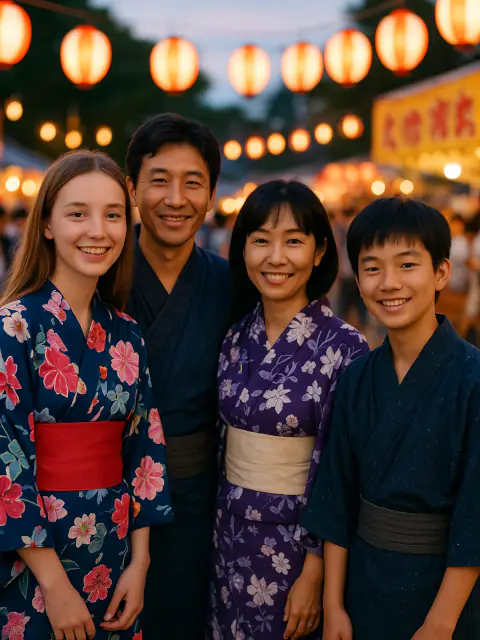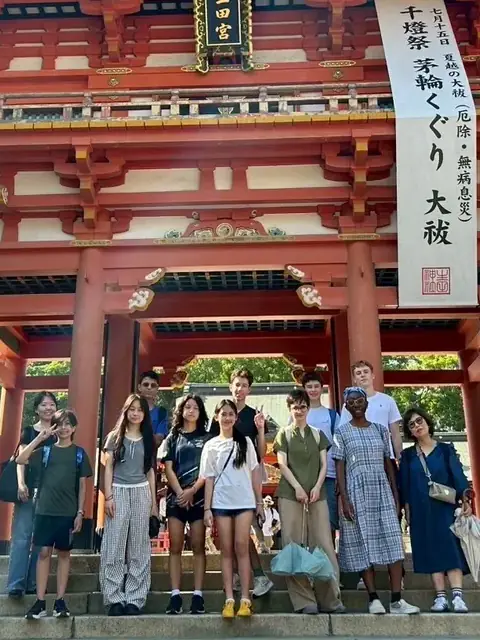Learn Japanese in Japan and immerse yourself into the language. We partner with carefully selected language schools throughout all of Japan – from the north in Hokkaido to the south of Okinawa – and find the perfect school for you and your needs! No matter if you are a beginner and want to learn simple introduction in a short 2-week-course or if you want to become fluent in Japanese and study on a student visa for up to two years!
As former language students, we got to experience different schools and teaching styles ourself. Now we help you to navigate the jungle of different schools and courses throughout Japan! Our Team has several years of experience guiding students through the application process – from the very beginning until the start of your adventurous journey.
Our service is completely free! No hidden fees – full transparency.
Why? Because, as former language students we wish everyone interested in Japanese to find their ideal learning environment. Yet, navigating all the different language schools can be daunting, especially at the start of your multilingual journey. That’s why we’re here to help. Try our free online consultation and let’s see what suits you best!
ENJ helps you find the best Japanese language school in Japan for you – completely free of charge – and takes care of the entire organization of your language trip. From your very first consultation to the start of your adventure in Japan, we handle every detail so you can focus on what really matters: Learning Japanese in Japan.

Sapporo combines modern city life with nature, fresh air and clear seasons. Learn Japanese in a relaxed atmosphere, enjoy hot onsen, fresh sushi and immerse yourself in culture and everyday life – perfect for authentic Japanese learning in northern Japan.



In the metropolis of Tokyo, you will learn Japanese in the midst of vibrant life. Be inspired by the limitless possibilities – and experience how exciting it is to learn the language where it is spoken every day!




Surrounded by the majestic Alps, Nagano is a paradise for nature and outdoor lovers. The quiet, safe environment offers the best conditions for learning. Hot springs, clear air and winter sports make Nagano an ideal place for education combined with relaxation.



Kyoto is the heart of Japanese culture. With over 1,000 temples, traditional gardens and teahouses, you can experience Japan from its cultural side here. At the same time, Kyoto is modern and dynamic – perfect for anyone who wants to combine history and innovation.



Osaka is full of energy, warmth and legendary for its culinary delights. The modern metropolis offers everything: Shopping, street food, culture and economic opportunities. Its open mentality and vibrant city life make it an ideal place to live and learn.



For those who prefer a quieter atmosphere: Akashi is located between Himeji and Kobe. Popular destinations such as Kyoto, Osaka, and Nara can easily be reached on a day trip. This way, you stay close to the action while still enjoying the tranquility of a smaller city. Small classes, a modern learning concept, and living with a warm-hearted host family let you experience Japan like a local.



Fukuoka combines an urban lifestyle with a relaxed coastal flair. The city offers a warm climate, culinary highlights such as ramen and fresh fish as well as a lively start-up and creative scene – ideal for young people and language students.


There is no better place to learn Japanese than in Japan itself.
Surrounded by the language every day, you can immediately apply what you’ve learned in real situations.
Choose from a wide variety of Japanese language schools and courses, or get personalized advice from us. No matter your goals or level, there is a perfect course – and the right location to fit your lifestyle.
Whether you’re looking for a two-week beginner’s course to start simple conversations in Japanese, or a full-time intensive program with a student visa for up to two years, ENJ helps you find the Japanese language school that matches your needs. This way, you not only learn Japanese, but also dive deep into Japanese culture.
From the North to the South: The Best Places to Learn Japanese
From the snowy landscapes of Hokkaido to the subtropical atmosphere of Okinawa, ENJ connects you with carefully selected Japanese language schools across the country. We guide you step by step through the entire process – from your first consultation to the start of your Japanese course in Japan.
Learning Japanese is more than just a hobby – it’s a true door opener.
Cultural Benefits:
Anime, manga, and J-dramas often lose meaning in translation. Only in the original language do the nuances truly shine.
Traditional culture – tea ceremonies, kabuki theater, or Shinto rituals – becomes far more accessible when you understand the language.
Career Benefits:
Japan is the world’s third-largest economy. Companies like Toyota, Sony, Nintendo, and SoftBank value people who can bridge cultures and languages.
International companies with offices in Japan also prefer employees who can speak Japanese.
Personal Benefits:
Learning Japanese trains patience and analytical thinking. Many describe it as “meditation for the mind.”
There’s a sense of achievement when you can suddenly converse with locals or read a newspaper.
Example: Lukas, 27 from Hamburg, started learning Japanese to watch anime without subtitles. Three years later, he works for an automotive supplier in Nagoya – something impossible without Japanese skills.
Japanese has a reputation for being difficult – but that’s only partly true:
Grammar: No articles (“the/a”) or plurals. In many ways, grammar is more logical than other languages.
Pronunciation: Only five vowels (a, i, u, e, o). Words sound almost exactly as they’re written.
Writing: Three scripts – Hiragana, Katakana, and Kanji. Mastering them is the biggest challenge compared to European languages.
Tip: Learn Hiragana and Katakana first. Within weeks, you’ll be able to read simple texts and navigate Japan more easily.
A study trip to Japan acts like a language accelerator:
Immersion: At the supermarket, on the train, on the street – you’re surrounded by Japanese daily.
Immediate Use: Learn “hashi” (chopsticks) in class and use it that evening in a restaurant – it sticks instantly.
Cultural Context: Words are more than vocabulary. “Otsukaresama,” for example, literally means “you are tired,” but it’s used as a respectful workplace greeting – something you can only truly grasp in Japan.
Example: Miriam, 22 from Vienna, spent three months in Akashi. After two weeks she could order coffee, after six weeks chat with locals, and after three months read simple newspaper articles.
Yes – and it’s a perfect supplement to studying at a Japanese language school.
Preparation: Learn Hiragana and Katakana online before your trip.
Support: Use online tutoring during your stay to review grammar.
Career Focus: Many online courses offer business Japanese for interviews, meetings, and emails.
ENJ helps you with both: Online lessons and choosing the best Japanese language school in Japan.
Hiragana: The foundation of the language, used for particles, endings, and many everyday words. Example: たべる (taberu = to eat).
Katakana: Used for loanwords, brand names, and onomatopoeia. Example: コンピュータ (konpyūta = computer).
Tip: Learn Hiragana first, then Katakana. You’ll see Katakana everywhere in Japan – on menus, signs, and packaging.
Kanji: The third script, originally from Chinese, conveys meaning directly. Example: 山 (yama = mountain). About 2,000 are used in daily life. They seem complex, but they make texts clearer and easier to understand.
A popular resource for learning Kanji is Wanikani.
It depends on intensity and goals:
Basic (ordering food, small talk): 3–6 months
Intermediate (JLPT N3–N2, work/study possible): 1–2 years of intensive study
Advanced (JLPT N1, professional level): 3–5 years
Studying at a Japanese language school in Japan often cuts learning time in half.
Example: Andreas, 30 from Cologne, studied online for a year. After three months in Osaka, he reached the same level that would have taken him three years in his home country.
Typical expenses for three months:
Language course: €1,500–2,500
Accommodation: €400–800 per month (share house, dorm, or host family)
Living costs: €600–1,000 per month (cheaper outside Tokyo)
ENJ helps you find the best Japanese language school at transparent prices – without expensive middlemen.
Tokyo: The world’s largest metropolis, international, many schools.
Kyoto: Historic capital, tradition, and culture.
Osaka: Friendly locals, famous for street food, strong career networks.
Sapporo (Hokkaido): Nature, cooler summers, lower costs.
Insider Tip: For a quieter environment, choose Sapporo or Akashi. For career networking, Tokyo or Osaka is best.
Many struggle with applications and forms – ENJ takes care of it.
Process:
Free consultation
Selection of suitable schools (budget, city, goals)
Support with applications and visas
Help with accommodation and arrival
You only pay the school itself – ENJ’s service is free.
Definitely. Many companies require JLPT N2 or N1.
IT & Engineering: High demand, attractive salaries
Project Management: Language skills help bridge teams
Tourism & Culture: Japanese is essential for guiding and guest services
ENJ connects you with the best Japanese language school for your career goals.
No prior knowledge required.
Beginners: Start with Hiragana and Katakana.
Intermediate learners: Improve grammar and Kanji.
Advanced: Prepare for JLPT exams.
There’s a Japanese language school program for every level.
Immersion: Live in Japan, listen, and speak daily.
Structured Classes: Study grammar and Kanji in a Japanese language school.
Self-Study: Apps like Anki or Duolingo.
Online Lessons: Personalized correction and career prep.
Example: Many students start with apps, then take a study trip, then focus on career-specific Japanese online.
A study trip is more than just lessons:
Classes: 15–25 hours per week
Activities: Tea ceremonies, calligraphy, cultural trips
Daily Life: Host family or dormitory living
This way you don’t just learn Japanese, you experience culture, manners, and mindset.
Of course. But the difference is huge.
In your home country, you study in class – then switch back to your mother language.
In Japan, you study in class – then keep practicing everywhere: shopping, trains, daily conversations.
Free: No fees for you
Personalized: We find the school that matches your goals
Experienced: We know the differences between schools and cities
Full Service: Applications, visas, accommodation, consultation
You save time, stress, and benefit from our first-hand experience as former language students in Japan.
Learning Japanese is the key to truly understanding the culture and society, opening up new career opportunities, and giving you fresh inspiration for personal growth.
At the beginning, focus on learning Hiragana, mastering Katakana, building a foundation in grammar, and recognizing your first simple Kanji.
A language study trip provides motivation, real-life practice, and the chance to build international networks – all valuable for future career prospects.
Online lessons complement this perfectly, especially if you’re aiming for long-term career goals in Japan or with globally operating Japanese companies.
With ENJ, you have a free and experienced partner to make the process easier and help you find the best Japanese language school for your needs.
Learning Japanese is much more than just a hobby or a single course. It is a journey – into a new language, a new culture, and potentially even your professional future in Japan.